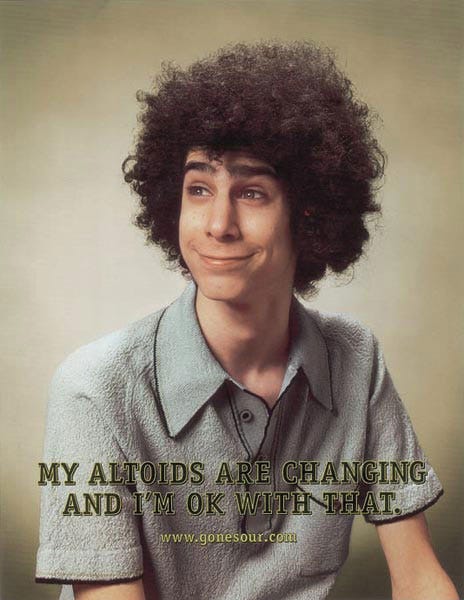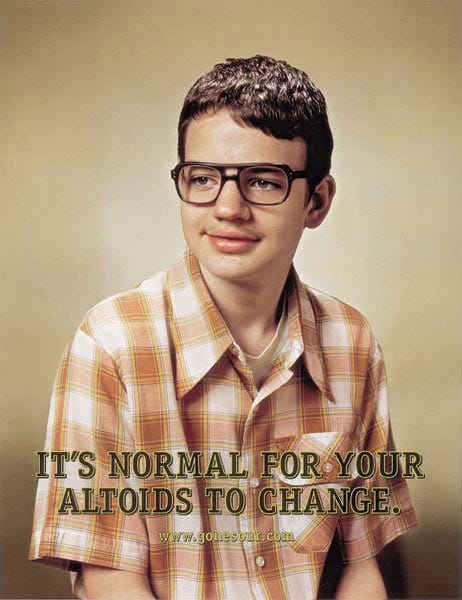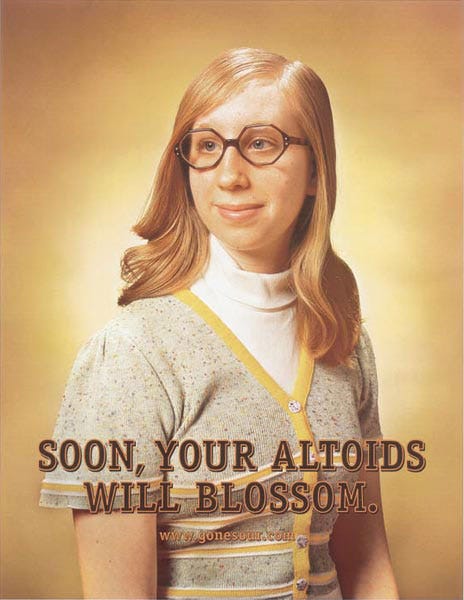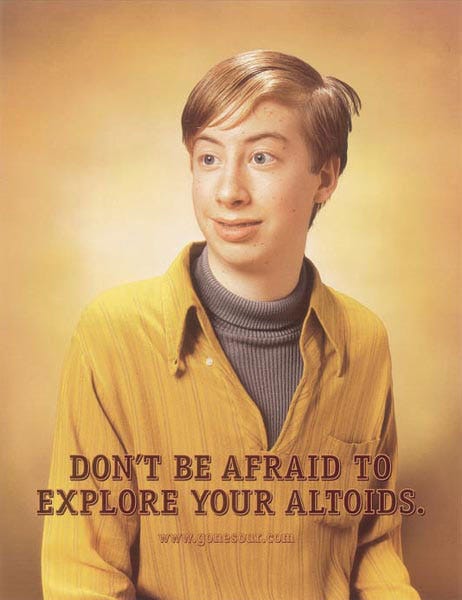My faith is changing, and I'm okay with that
Letting go of some things makes room for better things.
In 2001, the Altoids company rolled out a new product. Alongside their famous “curiously strong” mints, they introduced a line of sour candies, in raspberry, citrus, apple, tangerine, and mango flavors.
The product was fine; the sours ran for almost ten years before being discontinued. But I was an advertising student at BYU while these things were being marketed, so the part that I remember most is an award-winning print ad campaign that came out early in the product’s lifetime. The spots anchored around the idea that Altoids were “changing,” in a “late bloomer reaching puberty and your body is changing” sort of way. The ad I always remembered is this one, which says, “My Altoids are changing, and I’m OK with that”:
Change is hard. When we are raised being taught to believe certain things, or to behave in certain ways, those things tend to stick with us.
Like the caffeine thing. If you were raised in the Church, which way did your family go on caffeine?
I wasn’t raised in an overly strict home, as far as Latter-day Saints go, but we were a “no caffeine” house.1 I know there are many of us that were raised that way, under the assumption that either 1) drinking caffeine violated the Word of Wisdom, or 2) drinking caffeine might possibly violate the Word of Wisdom, and better safe than sorry. Other Latter-day Saint households did not have this rule, and as far as I can tell, they have not been struck down to eternal misery.
We have clarity now that the Church doesn’t care one way or the other about caffeine (with the exception of coffee and tea, of course, although that’s its own topic). In 2012 the Church Newsroom posted that "the church does not prohibit the use of caffeine." In 2017, to much fanfare, BYU started selling caffeinated sodas on campus, and just one month ago—really, seven years after BYU made the change!—BYU-Idaho followed suit and now sells caffeinated drinks. What a ride, for something that never really mattered.
For years I have struggled with chronic headaches. Different doctors have told me that they are or aren’t migraines, but at any rate, I have often gotten these crushing headaches that take me out of useful society for a day or more. Ibuprofen doesn’t touch them, and I had gotten used to just struggling through them.
Maybe you know where this is going, but I did find something that helps my headaches, and it’s caffeine. The thing that reliably gives me relief now is the medicine designed for tension headaches, which includes caffeine—but much of the time I can get the same effect from drinking a Dr. Pepper. I transitioned rather quickly, somewhat out of necessity, from never drinking caffeine to having it be a productive part of my life.
My wife, Anne, on the other hand, still holds on to the “no caffeine” thing. Not because she believes it’s a rule, but because it’s so deeply ingrained from how she was taught growing up. She also does not drink soda with any regularity, so it’s not really an issue that comes up, but she openly acknowledges that the hesitation with caffeine is bound in tradition and not in logic, reason, or faith.
Another one that’s relevant to my Millenial generation is the idea that girls and women should not have multiple sets of earrings. This originated in President Gordon B. Hinckley’s 6 B’s talk in 2000, and showed up in many, many Church lessons after that (I say that as someone who was in Young Men at the time; I can only imagine how it was in Young Women). But it was still only a cultural impact—it was never a commandment, even though we treated it like it was and this idea was deeply imprinted in many of us. Now there are many women at church each Sunday with multiple sets of earrings, but I know that some of them had to overcome the cultural baggage. They had to make a change, vs. what was so solidly distilled in them.
I’ve been this way about many things, that I had to come around on. One notable one for me is that I didn’t understand the importance of knowing about our Heavenly Mother, and had been taught—again, it was deeply ingrained—that we should not talk about Her. I was, of course, wrong. She has been talked about many times in General Conference and the doctrine is taught clearly and in plain language on the Church website.
But there’s still that baggage. Once I understood how important the existence of Heavenly Mother can be, especially to women, I knew I had to come around on this one. I had to change.
This week the Black Menaces posted a new video, where they asked shoppers in Walmart who they plan to vote for in the upcoming U.S. presidential election, and why. Per usual, the video was somewhere between funny and frightening, as people firmly responded with their preferred candidate but couldn’t explain why—other than that it’s their parents’ preferred candidate. One person says, “Most of my political opinions I get from my parents,” and another says they are making their choice “…from what my parents tell me.”
One on hand, this shows an admirable level of deference to one’s elders, and on the other hand, this level of civic involvement (or lack thereof) is assuredly not what the Founding Fathers had in mind when they installed a democratic republic in the fledgling new United States.
Many Latter-day Saints were taught growing up that one political party aligned with the Church, despite the Church’s insistence that it was not so.2 I was taught this, though not strongly, as my parents generally tended to vote on one side of the aisle (but also voted once for an independent candidate).
For some years I was like those people in the video; I didn’t understand why it was important to formulate my own political opinions. As I reached voting age, my political opinions matched those of my parents and/or other influential people in my life. But fortunately, this was an easier change for me to make. I’m not here to advocate for a party or a candidate, but I found that the party I supported by default did not actually stand for what I stand for, and even evolved over a few years to align even less with my political and religious views. I had to leave the baggage behind, and change.
I’ve written before about the importance of choosing—as opposed to not choosing at all—when it comes to our faith and our participation in the Church. For those of us who were raised in the Church, we all have things that we learned from our parents, from primary teachers, from Young Men and Young Women leaders, that affect the way we relate to God. Hopefully most of those are things we can keep. But maybe we need to let some of that baggage go so that we can form a relationship with our Heavenly Parents for ourselves, instead of falling in line with what worked for someone else.
I was able to shake the idea that caffeine was of the devil, and that was relatively easy. But much harder is shaking the idea that the Church should be perfect, and that every word of the prophet should be eternally true. I had to come to terms with the reality that the scriptures, as much as they have blessed my life, were written by other fallible humans, and sometimes they contradict themselves. I’m working on understanding for myself more fully who our Heavenly Parents are, even when I get the impression that other people sitting in the same pews at church are fine taking Them at face value.
The change is hard. Moving into another stage of faith feels like breaking fine china with a baseball bat.
But I feel like the difficulty inherent in this change is part of the process. Asking questions that can’t be answered with the “Sunday School answers” means having to study and search and scratch for answers that are more meaningful. Sitting in a church meeting where an older member of the ward says something bigoted forces me to contextualize the roles that the institutional church and its members play in my spiritual journey.
I don’t know where you’re at, or if you’re even on this same journey. But if you’re in this same spot, if you’re working your way through the hard parts, I feel you. We need each other. The road is easier when we can lean on each other.
In some ways I wish I could go back to being the younger me, that coasted through church and had a testimony that was somehow both shallower and felt stronger. But that’s the road I’m on. I’m leaving behind baggage, bit by bit, and I’m becoming a better person and a better Christian the more I do. I’ve seen blessings of knowledge and understanding that I wouldn’t have expected before. The process stinks, for sure. But a gauntlet of faith may be the most important thing that’s ever happened to me.
I relate to how Sarah Bessey describes this process, in her book Out of Sorts: Making Sense of an Evolving Faith:
Anyone who gets to the end of their life with the exact same beliefs and opinions as they had at the beginning is doing it wrong.
It’s not exactly the sort of sentiment most of us Latter-day Saints are printing in vinyl letters and hanging on the wall by the kitchen table. But there’s also something familiar and scriptural about this idea, that change—and difficult change—is going to be necessary. Like Paul said to the Corinthians, “When I was a child, I spoke like a child, I thought like a child, I reasoned like a child. When I became an adult, I put an end to childish ways.” My old faith got me up to a certain point. My new faith, birthed of the old, will take me further.
Or in other words, my faith is changing. It’s changing right now. And I’m okay with that.
I’m not entirely sure how much this was a rule, to be honest, because we also just didn’t have soda around, ever. If not from my parents, I may have picked up the “rule” from other authority figures in my orbit when I was young.
The Church’s current statement of political neutrality is here. The Church’s history as it intersects with politics is much more than that, especially when it comes to influential figures like President Ezra Taft Benson and controversial ballot measures like California’s Prop 22 and Prop 8.






I feel all of this so much!